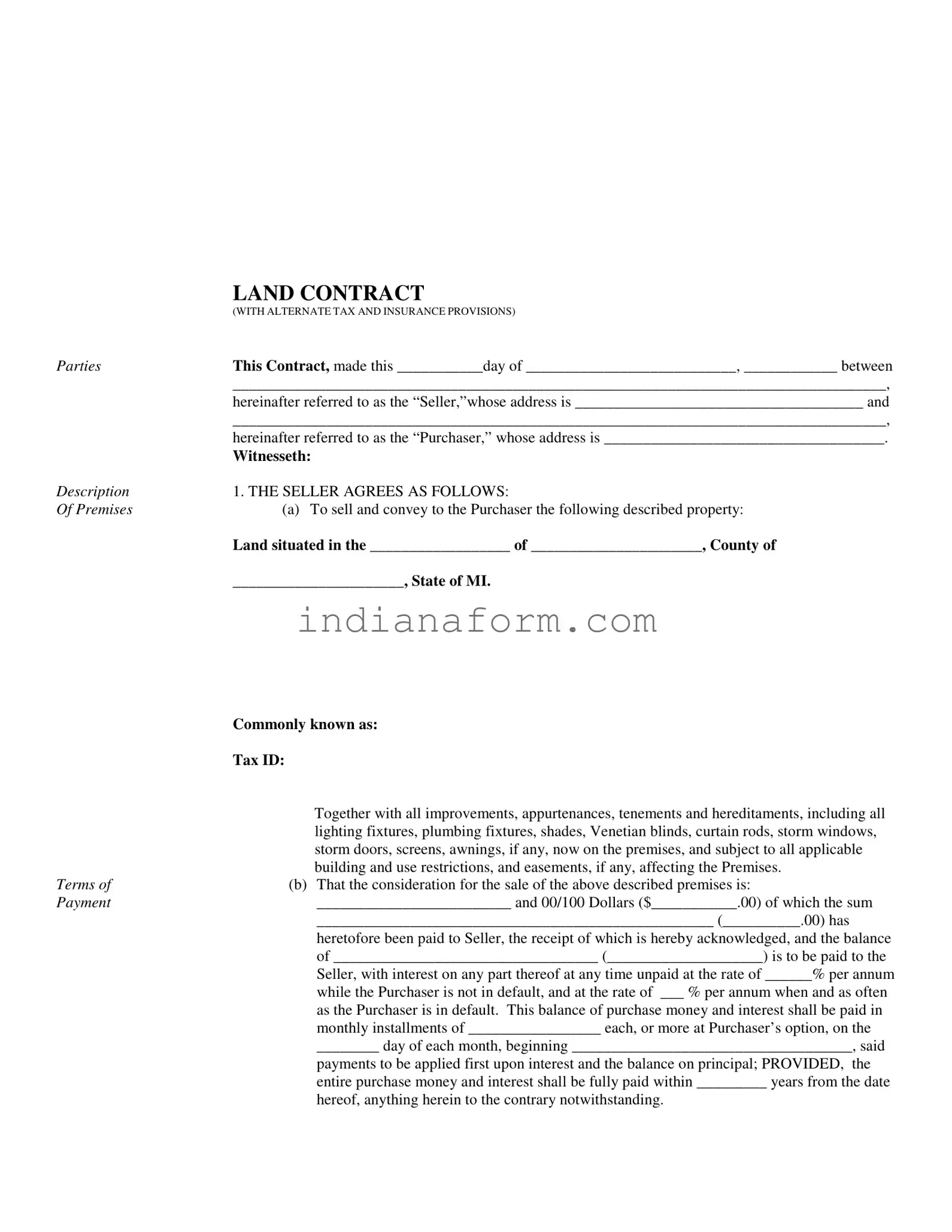Mortgage by Seller |
3. THE SELLER AND PURCHASER MUTUALLY AGREE AS FOLLOWS: |
|
(a) That the Seller may, at any time during the continuance of this contract encumber said land by |
|
mortgage or mortgages to secure not more than the unpaid balance of this contract at the time |
|
such mortgage or mortgages are executed. Such mortgage or mortgages shall be payable in |
|
not less than three (3) years from the date of execution thereof and shall provide for payment |
|
of principal and interest in monthly installments which do not exceed such installments |
|
provided for in this contract; shall provide for a rate of interest on the unpaid balance of the |
|
mortgage debt which does not exceed the rate of interest provided in Paragraph 1 (b); or on |
|
such other items as may be agreed upon by the Seller and Purchaser, and shall be a first lien |
|
upon the land superior to the rights of Purchaser herein; provided notice of the execution of |
|
said mortgage or mortgages containing the name and address of the mortgagee or his agent, |
|
the amount of such mortgage or mortgages, the rate of interest and maturity of the principal |
|
and interest shall be sent to the Purchaser by registered mail promptly after execution thereof. |
|
Purchaser will, on demand, execute any instruments demanded by the Seller, necessary or |
|
requisite to subordinate the rights of the Purchaser hereunder to the lien of any such mortgage |
|
or mortgages. In event said Purchaser shall refuse to execute any instruments demanded by |
|
Seller and shall refuse to accept such registered mail hereinbefore provided, or said registered |
|
mail shall be returned unclaimed, then the Seller may post such notice in two conspicuous |
|
places on said premises, and upon making affidavit duly sworn to of such posting, this |
|
proceeding shall operate the same as if said Purchaser had consented to the execution of said |
|
mortgage or mortgages, and Purchaser’s rights shall be subordinate to said mortgage or |
|
mortgages as hereinbefore provided. The consent obtained, or subordination as otherwise |
|
herein provided, under or by virtue of the foregoing power, shall extend to any and all |
|
renewals or extensions or amendments of said mortgage or mortgages, after Seller has given |
|
notice to the Purchaser as above provided for giving notice of the execution of said mortgage |
|
or mortgages. |
Encumbrances on |
(b) That if the Seller’s interest be that of land contract, or now or hereafter be encumbered by |
Seller’s Title |
mortgage, the Seller shall meet the payments of principal and interest thereon as they mature |
|
and produce evidence thereof to the Purchaser on demand, and in default of the Seller said |
|
Purchaser may pay the same. Such payments by Purchaser shall be credited on the sums first |
|
maturing hereon, with interest at the rate provided in Paragraph 1 (b) on payments so made. |
|
If proceedings are commenced to recover possession or to enforce the payment of such |
|
contract or mortgage because of the Seller’s default, the Purchaser may at any time thereafter, |
|
while such proceeding are pending, encumber said land by mortgage securing such sum as |
|
can be obtained, upon such terms as may be required, and with the proceeds pay and |
|
discharge such mortgage, or purchase money lien. Any mortgage so given shall be a first lien |
|
upon the land superior to the rights of the Seller therein, and thereafter the Purchaser shall |
|
pay the principal and interest on such mortgage so given as they mature, which payments |
|
shall be credited on the sums of matured or first maturing hereon. When the sum owing |
|
hereon is reduced to the amount owing upon such contract or mortgage or owing on any |
|
mortgage executed under either of the powers in this contract a conveyance shall be made in |
|
the form above provided containing a covenant by the grantee to assume and agree to pay the |
|
same. |
Non-payment of Taxes or |
(c) That if default is made by the Purchaser in the payment of any taxes, assessments or |
Insurance |
insurance premiums, or in the payment of the sums provided for in Paragraph 2(e), or in the |
|
delivery of any policy as herein before provided, the Seller may pay such taxes or premiums |
|
or procure such insurance and pay the premium or premiums thereon , and any sum or sums |
|
so paid shall be a further lien on the land and premises, payable by the Purchaser to Seller |
|
forthwith with interest at the rate as set forth in Paragraph 1(b) hereof. |
Assignment by Purchaser |
(d) No assignment or conveyance by the Purchaser shall create any liability whatsoever against |
|
the Seller until a duplicate thereof, duly witnessed and acknowledged, together with the |
|
residence address of such assignee, shall be delivered to the Seller. Purchaser’s liability |
|
hereunder shall not be released or affected in any way by delivery of such assignment, or by |
|
Seller’s endorsement of receipt and/or acceptance thereon. |

